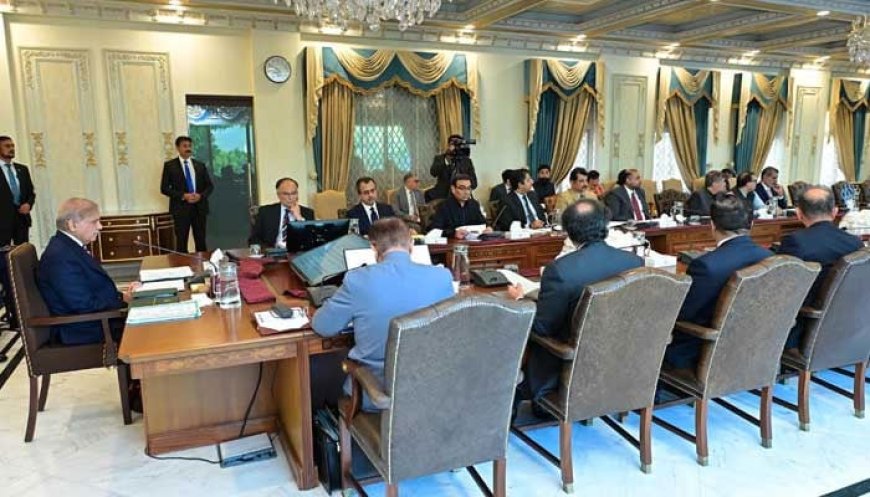Federal cabinet to mull over constitutional amendments

1. Govt, opposition form consensus over draft for proposed amendment after month-long deliberations
**ISLAMABAD:** The federal cabinet is scheduled to meet today (Saturday) to discuss key constitutional amendments, following the approval of the draft after a month of deliberations.
The proposed **26th Constitutional Amendment** has been unanimously approved by both government and opposition members, marking a significant political development after weeks of back-and-forth negotiations.
### Unanimous Approval and Political Tensions
The announcement came after a special committee, led by **Syed Khursheed Shah** of the Pakistan Peoples Party (PPP), reviewed the controversial judicial reforms package. Representatives from all major political parties, except Awami National Party’s **Aimal Wali Khan**, attended the session.
The draft includes the formation of a **constitutional bench**, restructuring of the **Judicial Council** and **Supreme Judicial Council**, and a proposal to limit the **Chief Justice’s tenure** to three years. It also outlines a new parliamentary role in appointing the Chief Justice from a pool of three senior judges.
If approved by the cabinet, the amendments will be presented in the **Senate** during its session, scheduled for 12:30 PM. Although opposition parties, including Pakistan Tehreek-e-Insaf (PTI), initially indicated agreement, no formal signatures have been obtained.
### PTI's Reservations
PTI officials, however, refuted claims of unanimous approval. **Barrister Gohar Ali Khan**, PTI Chairman, clarified that the party is still consulting on the government's fourth draft and will make a final decision after consulting with PTI founder **Imran Khan**, currently imprisoned in Adiala Jail.
In response, PPP Chairman **Bilawal Bhutto-Zardari** warned that if opposition support falters, he might seek a more contentious path to pass the amendments with backing from the **Pakistan Muslim League-Nawaz (PML-N)** and other members. "If consensus fails despite compromises, I will pass the amendments with support from PML-N and additional members," Bilawal stated.
Meanwhile, **Jamiat Ulema-e-Islam-Fazl (JUI-F)** reiterated its opposition, with **Maulana Abdul Ghafoor Haideri** warning, "We will not support the amendments under coercion, even if it costs us our lives."
### Government’s Challenge in Securing Majority
The government needs a two-thirds majority in Parliament to pass the amendments. However, it reportedly falls short by **13 votes in the National Assembly** and **nine votes in the Senate**. Last month, an attempt to table the package failed after JUI-F withdrew support, leaving the amendments in limbo.
Bilawal expressed hope for consensus but hinted that the government could still pursue a strategy of "conscience voting" to secure the required numbers.
### Judicial Changes and Amendments
The proposed amendments include several major changes:
1. **Formation of Constitutional Benches**
- A new **Article 19-A** empowers the **Judicial Commission** to form constitutional benches with proportional representation from each province.
- Only these benches will handle cases under **Article 184** (original jurisdiction) and appeals involving constitutional matters.
2. **Appointment of Chief Justice**
- A **Special Parliamentary Committee** will nominate the Chief Justice from the three most senior judges.
- The Prime Minister will forward the recommendation to the President, and in case of refusal, the next judge will be considered until an appointment is finalized.
- The Chief Justice's tenure will be limited to **three years** or until they reach **65 years of age**, whichever comes first.
3. **Restructuring the Judicial Commission**
- The Judicial Commission will now include representatives from both houses of Parliament, the Law Minister, the Attorney General, and the Pakistan Bar Council.
- The commission will conduct annual performance evaluations of high court judges and recommend improvements or removal where necessary.
4. **Supreme Judicial Council (SJC) Reforms**
- The SJC will consist of the Chief Justice, the two most senior Supreme Court judges, and two senior high court chief justices.
- It will also establish a **code of conduct** for judges, ensuring accountability within the judiciary.
5. **Changes to High Court Eligibility**
- The draft raises the minimum age requirement for high court judges to **40 years** and mandates at least **10 years** of legal practice or judicial service.
6. **Separation of Presidential Advice from Judicial Oversight**
- An amendment to **Article 48** will bar courts from questioning the advice tendered to the President by the Prime Minister or cabinet.
### Conclusion
These amendments aim to address long-standing demands for judicial reforms by rebalancing powers between the judiciary and parliament. However, with opposition parties divided, the success of the government’s efforts hinges on delicate negotiations and last-minute political maneuvering. The path to consensus remains uncertain as both coalition partners and opposition members brace for intense parliamentary sessions in the coming days.


















































